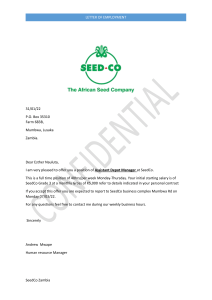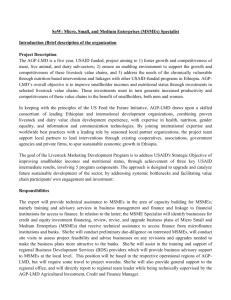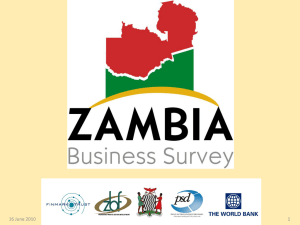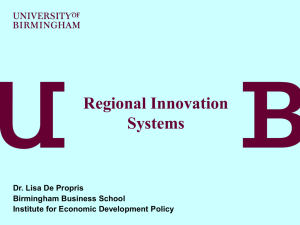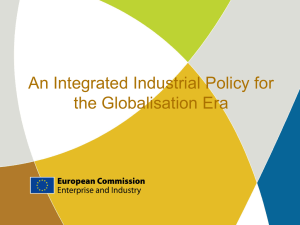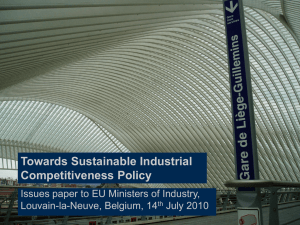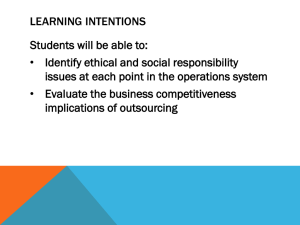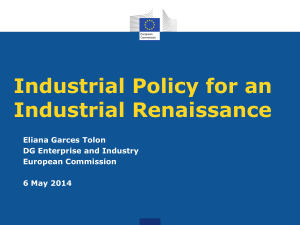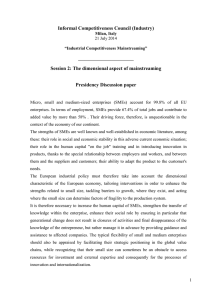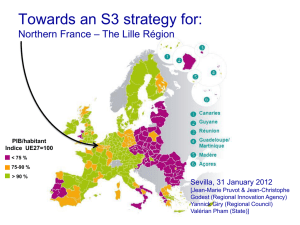Kabaghe`s Presentation COMESA Business Forum Kampala Uganda
advertisement
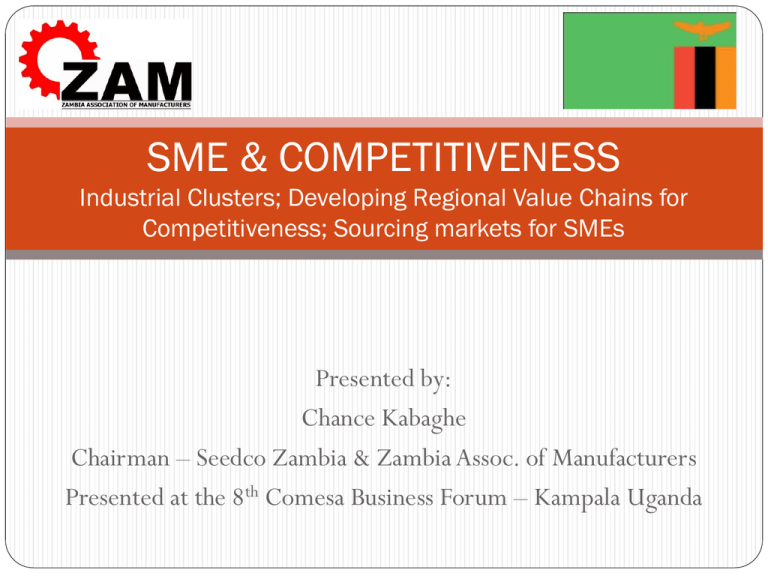
SME & COMPETITIVENESS Industrial Clusters; Developing Regional Value Chains for Competitiveness; Sourcing markets for SMEs Presented by: Chance Kabaghe Chairman – Seedco Zambia & Zambia Assoc. of Manufacturers Presented at the 8th Comesa Business Forum – Kampala Uganda Organisation of Presentation Introduction Factors of Competitiveness Industrial Clusters Opportunities for MSMEs – Seedco Model Challenges of working with MSMEs Recommendations Introduction on ZAM & Seedco ZAM is a Business Association which is a voice of Industry particularly the Manufacturing Sector We represent up to 19 subsectors in the manufacturing sector including agro processing. Membership of 240 with 180 active members Seed Co develops and markets certified crop seeds, mainly hybrid maize seed, but also cotton seed, wheat, soya bean, barley, sorghum and ground nut seed. Most of our hybrid and non-hybrid cereals and oil crop seed varieties are proprietary, having been developed and bred at our research stations through market-oriented research and breeding program. Seed Co Limited, a public listed company incorporated in Zimbabwe and quoted on the Zimbabwe Stock Exchange, is the leading producer and marketer of certified crop seeds in Southern Africa. Factors of Competitiveness Definition of Competitiveness in terms of outcome rather than factors that determine competitiveness “the ability to produce goods and services which meet the test of international markets, while at the same time maintaining high and sustainable levels of income or, more generally, the ability of (regions) to generate, while being exposed to external competition, relatively high income and employment levels” Factors of Competitiveness: Basic infrastructure and accessibility Human capital Other factors such as R&D, Innovation, demography etc Industrial Clusters Focus for the Government of Zambia as an instrument for industrialization as well as a tool to realize economies of scale. Clusters are not a new phenomena, they have worked very well in countries such as Ethiopia, Cambodia, Germany just to mention a few. There must be a two pronged approach; National and Regional level Attention must be paid to market and business linkages if these clusters are to survive COMESA roll out of Industrial clusters must have strong linkages at regional level for purposes of supplying big markets such as US through AGOA, Europe, Asia etc Need for specialization in the region depending on comparative and competitive advantage Opportunities for MSMEs – Seedco as a Model Outgrower schemes for farmers Distribution of seed within and outside Zambia Services Supply of products e.g. Protective Equipment, Opportunities for SMEs – ZAM Model In view of this the aim of the incubators to be established by ZAM in partnership with other stakeholders will be to reduce the overall cost of doing business by: Enhancing economies of scale (group procurement & supply) Provision of communal facilities thereby reducing the cost of acquiring equipment Increased bargaining power Guaranteed market linkages Infrastructure availability ( fully equipped cooperation and office facilities) Helping in combining business plan and strategy (Training) Access to finances Cont… Providing personal business mentors and coaches Partner and cooperation networks Contact network with other startup entrepreneurs Challenges of working with MSMEs Major constraints faced by MSMEs include limited access to affordable capital (Investment and Working Capital), High input cost, low productivity, high transport costs, registration procedures and cost and business management skills among others. These constraints result in: Inconsistent supply Quality Capacity to supply required demands Cost/ Price Recommendations To ensure standards in the MSME sector there must be emphasis on incubation facilities ( for start up especially) Clusters should be left for already established entrepreneurs and not start-ups Factors of competitiveness must be addressed if our SMEs are to compete both at national or regional level MSMEs must realize they are in business and therefore handout mentality/ attitudes must not be the center of discussion even at policy level There is need for Private sector participation if these clusters are to succeed, Governments must limit themselves to facilitation and not implementation Cont. To ensure these clusters are Private sector driven the COMESA model must focus on working with either Country focal points or other Private sector organizations depending on sector, government must be engaged at policy level. Contact Details We have a fairly fully fledged Secretariat in Lusaka Zambia Association of Manufacturers Postnet Box 424, Manda Hill Centre Showgrounds Stand No. 2374 Mopane Parade Tel: 253696 Fax: 253693 email: zam@zamnet.zm website: www.zam.co.zm
